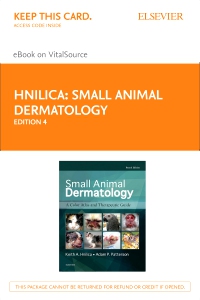
Small Animal Dermatology - Elsevier E-Book on VitalSource (Retail Access Card), 4th Edition
Elsevier eBook on VitalSource - Access Card

Streamlined for practical, everyday use in the clinic, Small Animal Dermatology: A Color Atlas and Therapeutic Guide, 4th Edition provides concise, thorough information on more than 250 skin diseases affecting small animals. More than 1,400 high-quality images help to ensure accurate diagnoses, with coverage including recognizable clinical signs, top differentials, diagnostic tests, treatment recommendations, and prognosis for each disorder. The differential diagnosis chapter adds clarity to the difficult task busy students and practitioners face every day – identifying what dermatologic condition is causing a dog, cat, or exotic animal to suffer. Chapters list diseases based upon the frequency of their occurrence in the pet population, and detailed procedures include helpful illustrations of key techniques.
-
- UPDATED! Enhanced breed predisposition information demonstrates in which dogs and cats dermatologic conditions are more likely to occur.
- NEW! Pattern approach dermatology content describes (with topographical images) where on the body, and in what formations, common dermatologic diseases exhibit.
- NEW! Updated key charts and tables, including: diseases affecting particular body regions, classification of common diseases by age of onset, and classification of symmetrically distributed disease from asymmetric disease.
- EXPANDED! Enhanced coverage of MRStaph and zoonotic and contagious skin diseases so your students stay in the know.
- NEW! Additional content on how cats may present with allergic skin disease shows students how to properly diagnose feline dermatologic conditions.
- NEW! Hundreds of new, high-quality images showcase better examples of conditions discussed in the text.
- Well-organized, concise, yet comprehensive, coverage of over 250 skin diseases in dogs, cats, birds, and exotic pets like rabbits, ferrets, hamsters, guinea pigs, gerbils, chinchillas, turtles, snakes, and lizards allows for quick and easy reference.
- Comprehensive drug appendices highlight information about dosage, adverse reactions, indications, and contraindications for antimicrobial, antiseborrheic, and antipruritic shampoo therapy, topical, otic, and systemic therapeutic drugs.
- UPDATED! Two thoroughly revised chapters include the most up-to-date information on differential diagnoses, algorithms, and diagnostic techniques.
- NEW! Co-authored by a recognized consulting dermatologist, Dr. Adam P. Patterson, making this an authoritative resource for the diagnosis of skin disease in small animals.
- NEW! Addition of bulleted content within each disease description informs students of specific indications of when it is necessary to culture and biopsy skin.
- UPDATED! The latest coverage on select diseases throughout, such as SLIT and Apoquel.
- NEW! Updated cutaneous lesions content with accompanying clarifying images explain what they mean and look like.
- UPDATED! Pyoderma content described based on the depth of disease, corresponding lesions, diagnostic/treatment plan, and common clinical entities of pyoderma fitting the depth of disease.
- Detailed procedures include helpful illustrations of key techniques.
- Thoroughly covers each disorder with recognizable clinical signs, top differentials, diagnostic tests, treatment recommendations, and prognoses.
- More than 1,450 vivid, full-color images in atlas format clearly demonstrate clinical appearance of skin lesions to facilitate accurate diagnosis and treatment.
- An atlas of before- and after-treatment images provides students with a compelling client communication tool to promote treatment acceptance and compliance.
- Emphasizes important information on the continuing emergence of zoonotic skin diseases in each chapter.
-
- UPDATED! Enhanced breed predisposition information demonstrates in which dogs and cats dermatologic conditions are more likely to occur.
- NEW! Pattern approach dermatology content describes (with topographical images) where on the body, and in what formations, common dermatologic diseases exhibit.
- NEW! Updated key charts and tables, including: diseases affecting particular body regions, classification of common diseases by age of onset, and classification of symmetrically distributed disease from asymmetric disease.
- EXPANDED! Enhanced coverage of MRStaph and zoonotic and contagious skin diseases so you stay in the know.
- NEW! Additional content on how cats may present with allergic skin disease shows you how to properly diagnose feline
- NEW! Hundreds of new, high-quality images showcase better examples of conditions discussed in the text.
- UPDATED! Two thoroughly revised chapters include the most up-to-date information on differential diagnoses, algorithms, and diagnostic techniques.
- NEW! Co-authored by a recognized consulting dermatologist, Dr. Adam P. Patterson, making this an authoritative resource for the diagnosis of skin disease in small animals.
- NEW! Addition of bulleted content within each disease description informs you of specific indications of when it is necessary to culture and biopsy skin.
- UPDATED! The latest coverage on select diseases throughout, such as SLIT and Apoquel.
- NEW! Updated cutaneous lesions content with accompanying clarifying images explain what they mean and look like.
- UPDATED! Pyoderma content described based on the depth of disease, corresponding lesions, diagnostic/treatment plan, and common clinical entities of pyoderma fitting the depth of disease.
-
1. Differential Diagnoses and Algorithms
2. Diagnostic Techniques
3. Bacterial Skin Diseases
4. Fungal Skin Diseases
5. Parasitic Skin Disorders
6. Viral, Rickettsial, and Protozoal Skin Diseases
7. Hypersensitivity Disorders
8. Autoimmune and Immune-Mediated Skin Disorders
9. Hereditary, Congenital, and Acquired Alopecia
10. Congenital Diseases
11. Pigmentary Abnormalities
12. Keratinization and Seborrheic Disorders
13. Diseases of the Eye, Ear, Claws, and Anal Sacs
14. Neoplastic and Non-Neoplastic Tumors
15. Avian and Exotic Animal Skin Diseases
16. Pre-treatment and Post-treatment Response Images
Appendices

 as described in our
as described in our 